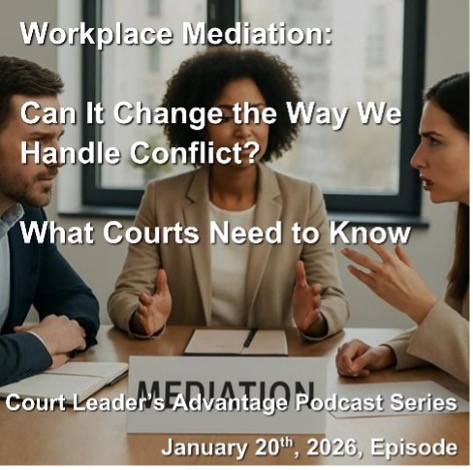Artificial Intelligence (A.I.) has already brought us general business tools that courts can use to assist in automating work, analyzing documents, and conducting legal analysis. As a start, courts will need to put their information into an electronic format that can be used by A.I. tools. They will also need to re-engineer their business practices. Small courts will have to be assertive in making their needs known. But, exactly how will A.I. tools help courts and what will we, as citizens, give up in privacy in order to maximize A.I.’s potential? Alan Carlson along with co-host Rick Pierce discuss how A.I. will be used in the courts and how soon it will be here.
Show Notes
> Additional Resources to Learn More About A.I.
Below are suggestions to learn more about A.I.
Alan Carlson, “Using Artificial Intelligence and Big Data to Develop Tools Used in Courts,” December 16, 2018.
Alexandra Mateescu and Madeleine Clare Elish, “AI in Context, The Labor of Integrating new Technologies, Data And Society,” January 30, 2019.
From Abstract: “In this report, we provide new evidence and frameworks for thinking about the near-term impacts of automated and AI technologies on society. Our report demonstrates the necessity to integrate rather than deploy AI technologies and to account for how AI technologies reconfigure work practices rather than replace workers.”
Nicole Clark, “Does Anyone Have Any Intel on My Judge?”, Law Practice Today, December 14, 2018. Nice summary of what AI tools cold be used by lawyers to better represent clients, lots of implications for courts/judges.
Legal Services Community, “Legal Services Community Principles and Guidelines for Due Process and Ethics in the Age of AI”, last updated: June 5, 2018, version 1.0.
Greg Berman, “Our 2 Kinds of Criminal Justice, and How to Reconcile Them, We need both micro justice and macro justice. But they aren’t always in sync.”, Governing, June 7, 2018.
Rachel Coldicutt, “Tech ethics, who are they good for?”, June 8, 2018. Asks questions of who benefits and who is harmed by tech tools – who the “subjects” of the policy are.
>About the Presenters

Alan Carlson retired at the end of 2016 after working 40 years in state trial courts. He was the CEO (court administrator, clerk of court, and jury commissioner) of the Orange County (CA) Superior Court, the CEO in San Francisco Superior Court, the Executive Officer of the Monterey Superior Court, and the Assistant Executive officer of the Alameda County Superior Court. Mr. Carlson also was president of JMI, Director of Court Services at the CA AOC, and a Staff Attorney at NCSC. Mr. Carlson received a Distinguished Service Award from the California Judicial Council in 2016, the NACM Award of Merit in 2012, and the ABA Robert B. Yegge Award in 2010. He was inducted as a member of the NCSC’s Warren Burger Society in 2012. He received a law degree from Hastings College of Law and a BS in engineering from University of California at Berkeley.
 Rick Pierce, Judicial Programs Administrator, has served in the field of court administration for the past thirty years. Prior to his appointment at the Administrative Office of Pennsylvania Courts, Pierce was the district court administrator for the 9th Judicial District of Pennsylvania, Cumberland County. As judicial programs administrator, he is responsible for implementation of programs and education in court administration at the general and limited jurisdiction court levels. Pierce was elected to the National Association for Court Management Board of Directors in July of 2017 and currently serves as a director and vice chair of the Governance Committee of NACM.Pierce served as the President of the Mid-Atlantic Association for Court Management from 2005-2006.He also served as President of the Pennsylvania Association of Court Management in 2000-2001.A graduate of Washington and Lee University, Pierce received his Master’s in Public Administration from Shippensburg University in 1995.
Rick Pierce, Judicial Programs Administrator, has served in the field of court administration for the past thirty years. Prior to his appointment at the Administrative Office of Pennsylvania Courts, Pierce was the district court administrator for the 9th Judicial District of Pennsylvania, Cumberland County. As judicial programs administrator, he is responsible for implementation of programs and education in court administration at the general and limited jurisdiction court levels. Pierce was elected to the National Association for Court Management Board of Directors in July of 2017 and currently serves as a director and vice chair of the Governance Committee of NACM.Pierce served as the President of the Mid-Atlantic Association for Court Management from 2005-2006.He also served as President of the Pennsylvania Association of Court Management in 2000-2001.A graduate of Washington and Lee University, Pierce received his Master’s in Public Administration from Shippensburg University in 1995.






